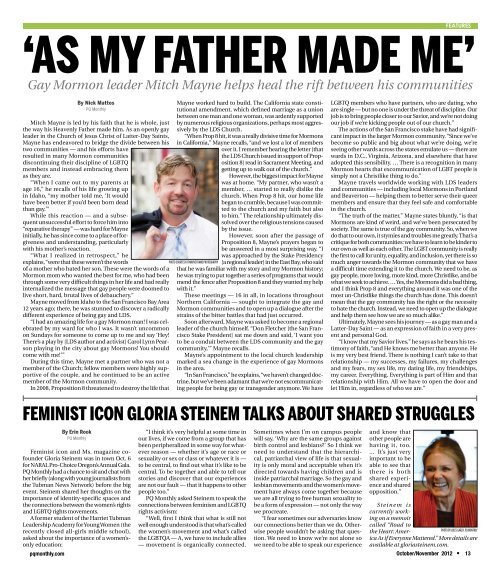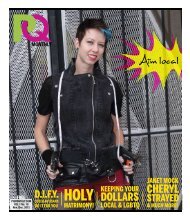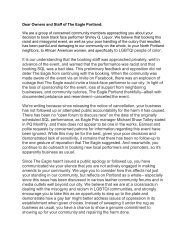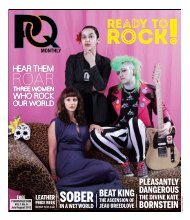Create successful ePaper yourself
Turn your PDF publications into a flip-book with our unique Google optimized e-Paper software.
FEATURES<br />
‘AS MY FATHER MADE ME’<br />
Gay Mormon leader Mitch Mayne helps heal the rift between his communities<br />
By Nick Mattos<br />
PQ Monthly<br />
Mitch Mayne is led by his faith that he is whole, just<br />
the way his Heavenly Father made him. As an openly gay<br />
leader in the Church of Jesus Christ of Latter-Day Saints,<br />
Mayne has endeavored to bridge the divide between his<br />
two communities — and his efforts have<br />
resulted in many Mormon communities<br />
discontinuing their discipline of LGBTQ<br />
members and instead embracing them<br />
as they are.<br />
“When I came out to my parents at<br />
age 16,” he recalls of his life growing up<br />
in Idaho, “my mother told me, ‘It would<br />
have been better if you’d been born dead<br />
than gay.’”<br />
While this reaction — and a subsequent<br />
unsuccessful effort to force him into<br />
“reparative therapy” — was hard for Mayne<br />
initially, he has since come to a place of forgiveness<br />
and understanding, particularly<br />
with his mother’s reaction.<br />
“What I realized in retrospect,” he<br />
explains, “were that these weren’t the words<br />
of a mother who hated her son. These were the words of a<br />
Mormon mom who wanted the best for me, who had been<br />
through some very difficult things in her life and had really<br />
internalized the message that gay people were doomed to<br />
live short, hard, brutal lives of debauchery.”<br />
Mayne moved from Idaho to the San Francisco Bay Area<br />
12 years ago; there, he was stunned to discover a radically<br />
different experience of being gay and LDS.<br />
“I had an amazing life for a gay Mormon man! I was celebrated<br />
by my ward for who I was. It wasn’t uncommon<br />
on Sundays for someone to come up to me and say ‘Hey!<br />
There’s a play by [LDS author and activist] Carol Lynn Pearson<br />
playing in the city about gay Mormons! You should<br />
come with me!’”<br />
During this time, Mayne met a partner who was not a<br />
member of the Church; fellow members were highly supportive<br />
of the couple, and he continued to be an active<br />
member of the Mormon community.<br />
In 2008, Proposition 8 threatened to destroy the life that<br />
Mayne worked hard to build. The California state constitutional<br />
amendment, which defined marriage as a union<br />
between one man and one woman, was ardently supported<br />
by numerous religious organizations, perhaps most aggressively<br />
by the LDS Church.<br />
“When Prop 8 hit, it was a really divisive time for Mormons<br />
in California,” Mayne recalls, “and we lost a lot of members<br />
over it. I remember hearing the letter [that<br />
the LDS Church issued in support of Proposition<br />
8] read in Sacrament Meeting, and<br />
getting up to walk out of the church.”<br />
However, the biggest impact for Mayne<br />
was at home. “My partner, who wasn’t a<br />
member, … started to really dislike the<br />
church. When Prop 8 hit, our home life<br />
began to crumble, because I was committed<br />
to the church and my faith but also<br />
to him.” The relationship ultimately dissolved<br />
over the religious tensions caused<br />
by the issue.<br />
However, soon after the passage of<br />
Proposition 8, Mayne’s prayers began to<br />
be answered in a most surprising way. “I<br />
was approached by the Stake Presidency<br />
[a regional leader] in the East Bay, who said<br />
that he was familiar with my story and my Mormon history;<br />
he was trying to put together a series of programs that would<br />
mend the fence after Proposition 8 and they wanted my help<br />
with it.”<br />
These meetings — 16 in all, in locations throughout<br />
Northern California — sought to integrate the gay and<br />
Mormon communities and to open up a dialogue after the<br />
strains of the bitter battles that had just occurred.<br />
Soon afterward, Mayne was asked to become a regional<br />
leader of the church himself. “Don Fletcher [the San Francisco<br />
Stake President] sat me down and said, ‘I want you<br />
to be a conduit between the LDS community and the gay<br />
community,’” Mayne recalls.<br />
Mayne’s appointment to the local church leadership<br />
marked a sea change in the experience of gay Mormons<br />
in the area.<br />
“In San Francisco,” he explains, “we haven’t changed doctrine,<br />
but we’ve been adamant that we’re not excommunicating<br />
people for being gay or transgender anymore. We have<br />
Photo courtesy of Mayne Frame Photography<br />
LGBTQ members who have partners, who are dating, who<br />
are single — but no one is under the threat of discipline. Our<br />
job is to bring people closer to our Savior, and we’re not doing<br />
our job if we’re kicking people out of our church.”<br />
The actions of the San Francisco stake have had significant<br />
impact in the larger Mormon community. “Since we’ve<br />
become so public and big about what we’re doing, we’re<br />
seeing other wards across the states emulate us — there are<br />
wards in D.C., Virginia, Arizona, and elsewhere that have<br />
adopted this sensibility. … There is a recognition in many<br />
Mormon hearts that excommunication of LGBT people is<br />
simply not a Christlike thing to do.”<br />
Mayne travels worldwide working with LDS leaders<br />
and communities — including local Mormons in Portland<br />
and Beaverton — helping them to better serve their queer<br />
members and ensure that they feel safe and comfortable<br />
in the church.<br />
“The truth of the matter,” Mayne states bluntly, “is that<br />
Mormons are kind of weird, and we’ve been persecuted by<br />
society. The same is true of the gay community. So, when we<br />
do that to our own, it stymies and troubles me greatly. That’s a<br />
critique for both communities: we have to learn to be kinder to<br />
our own as well as each other. The LGBT community is really<br />
the first to call for unity, equality, and inclusion, yet there is so<br />
much anger towards the Mormon community that we have<br />
a difficult time extending it to the church. We need to be, as<br />
gay people, more loving, more kind, more Christlike, and be<br />
what we seek to achieve. … Yes, the Mormons did a bad thing,<br />
and I think Prop 8 and everything around it was one of the<br />
most un-Christlike things the church has done. This doesn’t<br />
mean that the gay community has the right or the necessity<br />
to hate the church. Instead, we need to open up the dialogue<br />
and help them see how we are so much alike.”<br />
Ultimately, Mayne sees his journey — as a gay man and a<br />
Latter-Day Saint — as an expression of faith in a very present<br />
and personal God.<br />
“I know that my Savior lives,” he says as he bears his testimony<br />
of faith, “and He knows me better than anyone. He<br />
is my very best friend. There is nothing I can’t take to that<br />
relationship — my successes, my failures, my challenges<br />
and my fears, my sex life, my dating life, my friendships,<br />
my career. Everything. Everything is part of Him and that<br />
relationship with Him. All we have to open the door and<br />
let Him in, regardless of who we are.”<br />
FEMINIST IC<strong>ON</strong> GLORIA STEINEM TALKS AB<strong>OUT</strong> SHARED STRUGGLES<br />
By Erin Rook<br />
PQ Monthly<br />
Feminist icon and Ms. magazine cofounder<br />
Gloria Steinem was in town Oct. 6<br />
for NARAL Pro-Choice Oregon’s Annual Gala.<br />
PQ Monthly had a chance to sit and chat with<br />
her briefly (along with young journalists from<br />
the Tubman News Network) before the big<br />
event. Steinem shared her thoughts on the<br />
importance of identity-specific spaces and<br />
the connections between the women’s rights<br />
and LGBTQ rights movements.<br />
A former student of the Harriet Tubman<br />
Leadership Academy for Young Women (the<br />
recently closed all-girls middle school),<br />
asked about the importance of a women’sonly<br />
education:<br />
“I think it’s very helpful at some time in<br />
our lives, if we come from a group that has<br />
been peripheralized in some way for whatever<br />
reason — whether it’s age or race or<br />
sexuality or sex or class or whatever it is —<br />
to be central, to find out what it’s like to be<br />
central. To be together and able to tell our<br />
stories and discover that our experiences<br />
are not our fault — that it happens to other<br />
people too.”<br />
PQ Monthly asked Steinem to speak the<br />
connections between feminism and LGBTQ<br />
rights activism:<br />
“Well, first I think that what is still not<br />
well enough understood is that what’s called<br />
the women’s movement and what’s called<br />
the LGBTQA — A, we have to include allies<br />
— movement is organically connected.<br />
Sometimes when I’m on campus people<br />
will say, ‘Why are the same groups against<br />
birth control and lesbians?’ So I think we<br />
need to understand that the hierarchical,<br />
patriarchal view of life is that sexuality<br />
is only moral and acceptable when it’s<br />
directed towards having children and is<br />
inside patriarchal marriage. So the gay and<br />
lesbian movements and the women’s movement<br />
have always come together because<br />
we are all trying to free human sexuality to<br />
be a form of expression — not only the way<br />
we procreate.<br />
“I fear sometimes our adversaries know<br />
our connections better than we do. Otherwise<br />
people wouldn’t be asking that question.<br />
We need to know we’re not alone so<br />
we need to be able to speak our experience<br />
and know that<br />
other people are<br />
having it, too.<br />
... It’s just very<br />
important to be<br />
able to see that<br />
there is both<br />
shared experience<br />
and shared<br />
opposition.”<br />
St e i n e m i s<br />
currently working<br />
on a memoir<br />
called “Road to<br />
the Heart: America<br />
As if Everyone Mattered.” More details are<br />
available at gloriasteinem.com.<br />
Photo by Jules Garza, PQ Monthly<br />
pqmonthly.com October/November 2012 • 13






